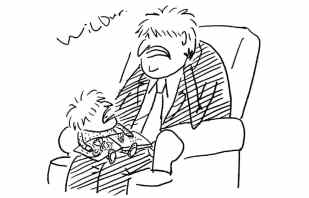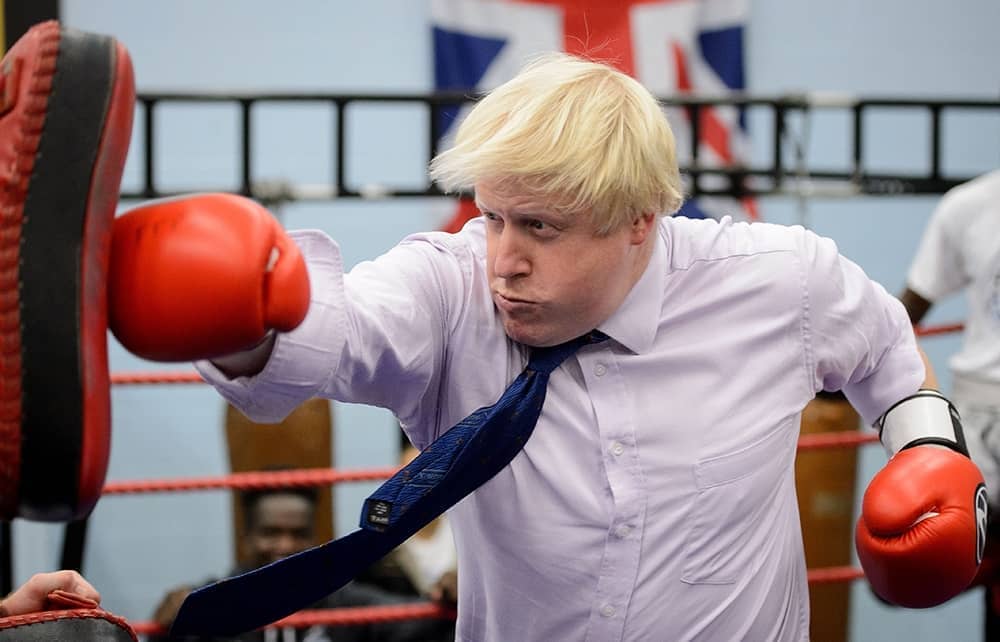Boris Johnson has never quite been able to decide whether he wants to be a great unifier or a great divider. Does he want to govern like he did at City Hall – the ‘generous-hearted, loving mayor of London’, as he once described himself – or is his best chance for re-election a return to the Brexit-style wars that landed him in Downing Street?
These days, there are plenty of signs that the government is in fight mode. The Prime Minister is risking a trade war with Brussels with threats to unilaterally rewrite the Northern Ireland Protocol, going to battle with civil servants over home-working and planning to deport asylum seekers to Rwanda.
Johnson can see the pros to a public fight. In the summer of 2019, he used the prorogation of parliament to appeal to Leave voters ahead of an election. He’s already made a virtue of opposition to the Home Office’s Rwanda plan, hitting out at the ‘leftie lawyers’ trying to thwart the migration crackdown. There are some in government who go so far as to think the policy will be most popular with the public if it ends up being blocked by the courts or House of Lords.
Regardless, Johnson’s deputy chief of staff David Canzini, looking ahead to the next general election, has heralded the Rwanda plan as an ideal wedge issue. Aides have been ordered to find more policies in their departments that divide the opposition. It’s not just Keir Starmer who the Tories want to put in a tight spot. After the Liberal Democrats took twice as many council seats from the Tories as Labour in this month’s local elections, the Conservatives are looking for issues that divide Ed Davey’s base. ‘It’s about the people who could switch between us and the Lib Dems and what could make them waiver,’ says an adviser.

For all the fighting talk, there’s concern growing in parts of government that some of these battles could be more bother than they’re worth. After a war of words on the government’s plan to rewrite parts of the Protocol, figures in No. 10 hit out at the Foreign Secretary and Canzini. One government official has complained in the media that the object of the exercise ‘with some people seems to be to have a fight’ as opposed to restoring the power sharing executive in Northern Ireland.
When Liz Truss finally unveiled the plans to parliament, the rhetoric she used was tougher than Johnson’s. Her approach is largely winning support among MPs for now, ahead of the Wakefield and Tiverton and Honiton by-elections on 23 June, the sixth anniversary of the Brexit vote. ‘Both are Leave seats – so talking tough is advantageous,’ says one MP.
However, there is disagreement in government regarding whether Johnson ought to call the EU’s bluff and override parts of the Protocol, risking a chain of events that could lead to Brussels responding with trade sanctions. There are nerves in the Treasury that a miscalculation would lead to a worsening of the cost-of-living crisis.
If that comes to pass, Truss may end up being the scapegoat. ‘They’ll blame her for getting the tone wrong,’ predicts one government adviser. One cabinet minister who backed Leave has long been reluctant for Johnson to rewrite the Protocol given he has a history of changing his mind. If the EU retaliates and Johnson backs down, the UK would be in a weakened position.
It’s not just on Brexit where the appeal of a fight is meeting resistance. When the cabinet met on an away day in Stoke last week, Jacob Rees-Mogg – the minister tasked with government efficiency – offered an update on his mission to return the number of civil servants to 2016 levels, which means reducing the workforce by 91,000. He explained to those assembled that his plan would begin with a recruitment freeze, which would include suspending the civil service fast-stream, the scheme designed to attract top-level graduates.
It’s not just Keir Starmer who the Tories want to put in a tight spot, but Ed Davey too
This notion led to such a frosty reaction from the cabinet that the Prime Minister intervened, telling ministers that he could see people wincing but it was vital the government sent a strong message. ‘What happened to securing the brightest and best?’ complains one cabinet minister. The latest thinking is that fast-stream decisions will be delegated to departments.
Johnson’s chief of staff Steve Barclay has begun an audit of civil servants. Aides are alarmed to learn there are estimated to be around 700 working in HR in the Cabinet Office alone and 80 still working on COP26, even though the summit ended in November (the UK retains the presidency throughout the year). Yet Rees-Mogg’s tactics have led some ministers to question whether a crackdown on civil servants is a battle worth fighting. One warns that restructuring will waste a lot of civil servants’ time to begin with and also risk bad blood. ‘We do need to work with these people,’ says another senior minister. A recent photo stunt of Rees-Mogg sitting behind his desk – which features a carriage clock, writing paper and little else – misfired. ‘How can you suggest you’re the model of efficiency while refusing to use a laptop?’ asks an adviser.
There are concerns that an attack on working from home could isolate the very voters the Tories need to get on side. ‘Working from home is quite popular with all the Lib Dem lot in the south. There are a lot of professional service people who have adopted it. We should be very careful before slagging all their work off,’ says one party figure who describes Mogg’s stunts as ‘performative’.
Other upcoming fights include the privatisation of Channel 4, plans for a new BBC funding model and a showdown with the rail unions about a summer of strikes over pay. When it comes to disagreements in government over how aggressive to be, the biggest problem is everyone tends to think Johnson is on their side. The Prime Minister has a habit of making people think he agrees with them, only to go on to change his mind.
Johnson would do well to state his intentions. There is nothing more dangerous than starting a fight you are not prepared to finish.
Watch Katy Balls on Spectator TV, on why Boris Johnson wants to pick a fight:







Comments